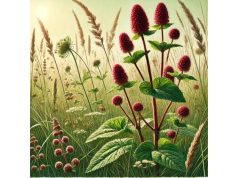
Black elderberry is one of the most widely used herbal fruits for cold and flu season, but it is also one of the most misunderstood. The dark purple berries of Sambucus nigra are rich in anthocyanins and other plant compounds that may help explain their traditional use for respiratory symptoms. Today, elderberry appears in syrups, gummies, capsules, teas, and juices, often marketed for “immune support.”
The key point is balance: black elderberry may help reduce the severity or duration of some upper respiratory symptoms in certain situations, but it is not a cure-all, and it is not a replacement for vaccines, antivirals, or medical care. Product quality and preparation also matter, because raw or unripe elderberries and other plant parts can be toxic.
This guide gives you a practical, evidence-aware overview of benefits, compounds, uses, dosage, safety, and what the research really supports.
Quick Overview
- Black elderberry may help shorten or ease some cold and flu symptoms, especially when started early.
- The berries contain anthocyanins and flavonoids, which are linked to antioxidant and anti-inflammatory effects.
- Raw or unripe berries, leaves, and stems can cause nausea, vomiting, and severe diarrhea unless properly processed.
- Short-term study doses commonly include 300–900 mg/day extract capsules or 15–60 mL/day syrup, depending on the product form.
- People who are pregnant or breastfeeding, and anyone taking prescription medicines, should check with a clinician before use.
Table of Contents
- What Is Black Elderberry and Whats In It
- Does Elderberry Help Colds and Flu
- Other Benefits and Realistic Expectations
- How to Use Elderberry Products
- How Much Black Elderberry Per Day
- Side Effects Interactions and Who Should Avoid
- What the Evidence Actually Says
What Is Black Elderberry and Whats In It
Black elderberry comes from Sambucus nigra, a shrub or small tree often called European elder or common elder. In supplements, the part most people mean by “elderberry” is the cooked or processed ripe fruit. This matters because the plant has several usable parts in traditional herbal practice, including flowers and berries, but they are not interchangeable in chemistry, dose, or safety.
The ripe berries are naturally tart and deeply pigmented. That dark color reflects their anthocyanin content, a class of polyphenols that also appears in blueberries, blackcurrants, and chokeberries. Black elderberry products are commonly marketed for respiratory support, especially during cold and flu season, but many people also take them for general wellness.
Key groups of active or notable compounds in elderberry include:
- Anthocyanins, which contribute antioxidant activity and are often treated as marker compounds in elderberry extracts.
- Flavonoids such as rutin and related polyphenols, which may support anti-inflammatory and vascular effects.
- Lectins and other plant proteins, which are discussed in mechanistic research and may contribute to some immune-related effects.
- Organic acids and other phenolics, which add to the overall chemical profile and antioxidant capacity.
A practical way to think about elderberry is that it is a whole-plant extract category, not one single ingredient. Two products can both say “elderberry” and still behave differently if they use different extraction methods, different berry-to-extract ratios, or different standardization targets. One syrup may emphasize anthocyanins, while another may simply list total elderberry juice concentrate with no standardization.
Another important distinction is raw plant material versus finished products. Properly prepared commercial syrups, capsules, and lozenges are designed to avoid the toxicity risks associated with raw or unripe berries and certain other plant parts. Homemade preparations can be safe, but only if the plant is correctly identified and fully processed.
If you are reading a label, look for these details:
- The plant name (Sambucus nigra).
- The part used (berry, not just “elder”).
- The form (juice, extract, syrup, capsule, lozenge).
- A standardization statement if provided (often anthocyanins).
- Serving size and total daily dose.
This foundation makes the rest of the article easier to apply, because most elderberry questions are really questions about which product, which dose, and which use case.
Does Elderberry Help Colds and Flu
This is the reason most people buy black elderberry, and it is where the strongest human evidence exists. The short version: elderberry may help reduce symptom severity and possibly shorten illness duration for some viral upper respiratory infections, but the evidence is still limited and not strong enough to treat it like a proven drug.
Most clinical studies have focused on:
- Influenza-like illness
- Colds and upper respiratory symptoms
- Short-term use (often a few days)
- Commercial products such as syrups, capsules, or lozenges
Across these studies, the pattern is fairly consistent: people who take elderberry early in the course of symptoms may report improvements in congestion, cough, fever, or overall symptom burden. A meta-analysis of randomized trials also found a meaningful reduction in upper respiratory symptoms, which is why elderberry remains popular. However, these trials are generally small, use different products, and measure outcomes in different ways.
That “different products” point is not a minor detail. One study may use a syrup, another a lozenge, and another a capsule. They may start treatment within 24 hours, 48 hours, or later. Some include confirmed influenza, while others include broader “cold and flu” symptoms. This makes it harder to give one universal answer about how well elderberry works.
A useful rule for real-life use is:
- Start early if you are trying it for acute symptoms.
- Use a defined commercial product with clear dosing.
- Treat it as supportive care, not a replacement for medical treatment.
Elderberry is best viewed as an option for mild, early, uncomplicated respiratory symptoms. It is not a substitute for evaluation if you have shortness of breath, chest pain, dehydration, worsening fever, or risk factors for complications.
It is also worth clearing up a common concern: some people worry elderberry could “overstimulate” the immune system and worsen inflammatory illness. Current clinical evidence has not shown clear proof of that in real-world respiratory use, but this topic still needs better research. The best interpretation is cautious, not alarmist.
What you can realistically expect:
- You might feel better a bit sooner.
- You might notice reduced symptom intensity.
- You should not expect guaranteed prevention.
- You should not expect it to treat severe flu or pneumonia.
In other words, black elderberry may be a helpful add-on for symptom management, but it works best when expectations are practical and safety remains the priority.
Other Benefits and Realistic Expectations
Black elderberry is often marketed far beyond colds and flu. You will see claims about immune health, inflammation, antioxidants, blood sugar, heart health, and even weight management. Some of these ideas have a scientific basis, but the evidence is uneven, and much of it comes from lab or animal research rather than large human trials.
Here is a grounded way to understand the broader benefit landscape.
1) Antioxidant support
This is the most credible “general wellness” claim. Elderberry contains anthocyanins and other polyphenols that have antioxidant activity. In plain terms, these compounds can help neutralize oxidative stress in laboratory models, and that may support tissue health over time.
The catch: antioxidant activity in a test tube does not always translate to a clear clinical outcome in people. It supports plausibility, not proof.
2) Inflammation and immune signaling
Elderberry extracts have been studied for effects on inflammatory pathways and cytokines. This is one reason people describe elderberry as an “immune support” herb. But immune signaling is complex. A plant compound can affect inflammatory markers in one setting and behave differently in another.
What is reasonable to say:
- Elderberry has biologically active compounds that may influence immune and inflammatory processes.
- Human outcomes remain more important than lab markers.
- Current evidence supports cautious use, not broad disease claims.
3) Metabolic and cardiometabolic interest
Some research has explored elderberry in areas such as glucose handling, lipids, and vascular health. This is a promising area, especially because polyphenol-rich foods often show cardiometabolic potential. Still, most people should think of elderberry as a supplement, not a primary metabolic treatment.
If your goal is blood sugar or cholesterol control, elderberry should not replace proven strategies such as prescribed medication, nutrition changes, exercise, sleep, and regular monitoring.
4) Food and functional use
One underappreciated advantage of black elderberry is that it can be used as a functional food ingredient, not only a supplement. Properly prepared elderberry juice, syrups, and cooked products can fit into a wellness routine for people who prefer food-based approaches.
A realistic summary of non-respiratory benefits looks like this:
- Likely: antioxidant intake and polyphenol exposure
- Possible: supportive immune and inflammatory effects
- Unclear: meaningful long-term benefits for chronic disease outcomes
- Not established: a stand-alone treatment for serious conditions
This “possible but not proven” category is where many herbs live. That does not make elderberry useless. It just means the most evidence-based way to use it is for short-term respiratory support, while treating broader wellness claims as secondary and still under investigation.
How to Use Elderberry Products
Black elderberry comes in many forms, and the best choice depends on your goal, your tolerance for sweetened products, and how precisely you want to dose it. The biggest mistake people make is assuming all forms are equivalent. They are not.
Common forms and when they make sense
- Syrup
- Most popular for cold and flu season
- Easy to use for adults and older children (depending on label)
- Often sweetened, which matters if you are watching sugar intake
- Capsules
- Convenient for travel
- Usually easier to track in mg
- Better if you want less sugar and more consistent dosing
- Lozenges
- Useful when sore throat or throat irritation is part of the problem
- Some studies used lozenge forms in acute influenza-like illness
- May be helpful for people who do not want liquids
- Gummies
- Popular but often lower-dose and higher-sugar
- Best treated as a supplement format, not automatically a therapeutic dose
- Label quality varies a lot
- Tea or dried preparations
- Traditional and comforting
- Dosing is less precise
- More variable in potency than standardized extracts
How to choose a better product
Use this checklist before buying:
- Look for the species name (Sambucus nigra).
- Check the part used (berry extract or berry juice).
- Read serving size and daily serving limits carefully.
- Avoid “proprietary blend” labels that hide exact amounts.
- Watch added sugars in syrups and gummies.
- Choose established brands with quality testing if possible.
Homemade elderberry preparations
Many people make elderberry syrup at home. That can be done safely, but it requires care:
- Use correctly identified elderberries.
- Do not use leaves, stems, or unripe berries.
- Follow a reliable recipe with full heating/cooking.
- Store properly and refrigerate.
- Treat homemade syrup as less standardized than commercial extract.
Practical use cases
- At symptom onset: a syrup, capsule, or lozenge can be easier to start immediately.
- For travel: capsules are easier to pack and measure.
- For people avoiding sugar: capsules usually fit better than syrup.
- For children: only use age-appropriate products and follow the product label or pediatric guidance.
A final note: elderberry products are often blended with zinc, vitamin C, or echinacea. These combo products are common, but they make it harder to know what is helping and can change safety considerations. If you are trying elderberry for the first time, a single-ingredient product is usually easier to evaluate.
How Much Black Elderberry Per Day
There is no single universal dose for black elderberry because dosing depends on the form, extract strength, and reason for use. Elderberry syrup, capsules, and lozenges are measured differently, and products are not standardized in the same way.
That said, clinical research gives a useful framework.
Doses used in studies
In respiratory studies summarized in systematic reviews, researchers used examples such as:
- Capsules: 300 mg proprietary extract taken 2 to 3 times daily (about 600–900 mg/day) in a prevention-style travel study
- Lozenges: 175 mg proprietary elderberry extract 4 times daily (about 700 mg/day) for short-term influenza-like symptoms
- Syrup: 15 mL syrup 4 times daily (about 60 mL/day) for about 5 days in adults with influenza-like illness
These are study regimens, not universal recommendations. A commercial product you buy may be more concentrated or less concentrated than the products used in research.
How to dose in real life
Use this approach instead of copying a study blindly:
- Start with the label
- The product label is the safest first reference because it matches that specific formula.
- Match your goal
- Acute symptom support is usually short-term and more frequent.
- General daily “immune support” products often use lower maintenance doses.
- Check the extract details
- Two products can both say “500 mg” but differ in actual active compounds.
- Avoid stacking products
- Do not take syrup, gummies, and capsules together unless you are sure of the total dose.
Timing and duration
For respiratory symptoms, elderberry appears most useful when taken early, often within the first 24 to 48 hours of symptoms. Starting late may reduce the chance of noticeable benefit.
Short-term use is the common pattern in studies:
- 2 to 5 days for acute symptom relief in some influenza-like illness trials
- About 2 weeks in some prevention-style settings (such as travel)
Long-term daily use is much less studied, so it is wise to be conservative if using it outside an acute period.
Special considerations
- Children: Dosing varies by product and age. Follow the label exactly, and ask a pediatric clinician if unsure.
- Older adults: Start with the lower end of the labeled dose, especially if taking multiple medications.
- Diabetes or glucose concerns: Syrups and gummies may add significant sugar.
If you cannot find clear dosing on a product or the label uses vague wording, skip it. With elderberry, good dosing decisions start with good labeling.
Side Effects Interactions and Who Should Avoid
Black elderberry is generally well tolerated when used in properly prepared commercial products, but “natural” does not mean risk-free. Most problems happen when people use raw plant parts, take unclear doses, or combine elderberry with medications without checking first.
Common side effects
When side effects happen, they are usually digestive:
- Nausea
- Stomach upset
- Vomiting
- Diarrhea
These are more likely with improper preparation, excessive use, or low-quality products.
The biggest safety issue: raw or unripe elderberry
Raw or unripe elderberries, and other parts of the elder plant such as the leaves and stems, contain cyanide-producing compounds. If consumed incorrectly, they can cause significant gastrointestinal symptoms and, in large amounts, serious toxicity.
This is why the source and preparation matter so much. Proper commercial processing and correct cooking are not optional details.
Medication interactions
Elderberry can interact with medicines, and the safest approach is simple: if you take prescription medication, ask a clinician or pharmacist before starting it.
Extra caution is sensible if you take:
- Immunomodulating or immunosuppressive drugs
- Diabetes medications
- Multiple medications for chronic illness
- Medicines with narrow dosing windows
Even when a severe interaction is not proven, supplements can still complicate care plans, especially during an acute illness.
Who should avoid or use only with medical advice
- Pregnant or breastfeeding people
- Safety data are limited, so avoidance is the conservative choice unless a clinician advises otherwise.
- People with significant medical conditions
- Especially if your condition affects immune function or requires close medication management.
- Young children
- Use only age-appropriate products and pediatric guidance. Do not assume adult syrup or gummies are suitable.
- Anyone with allergy concerns
- Stop use if you develop rash, itching, swelling, or breathing symptoms.
Practical safety rules
- Do not eat raw berries or use leaves and stems.
- Choose clearly labeled products from reputable manufacturers.
- Follow product dosing, not internet folklore.
- Stop and seek care if symptoms worsen or unusual side effects appear.
- Do not rely on elderberry alone for high-risk flu or severe infection symptoms.
For most healthy adults using a commercial product short term, elderberry is often manageable. The safety problems usually come from preparation mistakes and poor product choices, not from careful use.
What the Evidence Actually Says
Black elderberry is a good example of an herb with promising but limited evidence. There is enough research to justify informed use, especially for upper respiratory symptoms, but not enough to support the very broad claims often seen in marketing.
What the evidence supports most
The best-supported use is short-term support for viral upper respiratory symptoms, especially when taken early and in a studied product form. Several trials and a meta-analysis suggest elderberry may reduce symptom burden. Systematic reviews, however, emphasize uncertainty because the total number of high-quality studies is still small.
That means two statements can both be true:
- Elderberry may help.
- The evidence is not strong enough for firm conclusions in every setting.
What the evidence does not support well
- Reliable prevention of infection
- Some prevention-style studies are interesting, but results are mixed.
- Treatment of severe illness
- Elderberry is not a substitute for medical diagnosis or antiviral treatment when indicated.
- Broad disease claims
- Claims about cancer, autoimmune disease, or chronic metabolic disease are not established clinical uses.
COVID-19 and overstated immune claims
Elderberry was heavily marketed during the pandemic, but that outpaced the evidence. Current guidance does not support relying on elderberry to prevent or treat COVID-19. The same caution applies to vague “immune boosting” language. Immune health is not a single switch, and stronger is not always better.
Why results vary so much
The main reasons are practical:
- Different formulations (syrup, capsule, lozenge, juice)
- Different doses and extract strengths
- Different start times after symptom onset
- Different outcome measures
- Small study sizes
This is why one person may swear by elderberry syrup while another sees no effect. Variation is built into the evidence.
How to use the evidence wisely
Think of elderberry as a conditional tool, not a miracle remedy.
Use it if:
- You want a short-term supportive option for mild respiratory symptoms
- You have a well-labeled product
- You are using it alongside standard care, not instead of it
Do not lean on it if:
- You need a diagnosis
- You have severe symptoms or high-risk conditions
- You are using it to replace proven treatments
This evidence-first mindset keeps elderberry in the right lane: potentially helpful, often well tolerated, and worth considering when used carefully and realistically.
References
- Elderberry: Usefulness and Safety | NCCIH 2024 (Official Fact Sheet). ([NCCIH][1])
- Elderberry for prevention and treatment of viral respiratory illnesses: a systematic review – PMC 2021 (Systematic Review). ([PMC][2])
- Elderberry (Sambucus nigra L.): an ethnopharmacological, phytochemical and biological review for a prospective nutraceutical plant – PubMed 2026 (Review). ([PubMed][3])
- Black Elder and Its Constituents: Molecular Mechanisms of Action Associated with Female Reproduction – PMC 2022 (Review). ([PMC][4])
- Black elderberry (Sambucus nigra) supplementation effectively treats upper respiratory symptoms: A meta-analysis of randomized, controlled clinical trials – PubMed 2019 (Meta-Analysis). ([PubMed][5])
Disclaimer
This article is for educational purposes only and does not replace medical advice, diagnosis, or treatment. Herbal supplements can affect people differently based on age, health conditions, pregnancy status, and medications. If you have severe symptoms, a chronic illness, or take prescription medicines, speak with a qualified health professional before using black elderberry.
If you found this guide useful, please consider sharing it on Facebook, X, or any platform you prefer.






